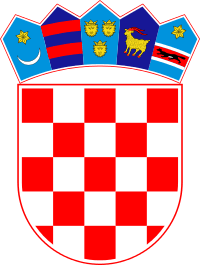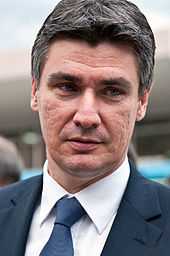Next Croatian parliamentary election
| | |||||||||||||||||||||||||||||||||||||||||||||||||||||||||||||||||||
| |||||||||||||||||||||||||||||||||||||||||||||||||||||||||||||||||||
| |||||||||||||||||||||||||||||||||||||||||||||||||||||||||||||||||||
| |||||||||||||||||||||||||||||||||||||||||||||||||||||||||||||||||||
| 2003 election • MPs |
| 2007 election • MPs |
| 2011 election • MPs |
| Next election |
 |
| This article is part of a series on the politics and government of Croatia |
| Constitution |
|
Legislative
|
|
|
|
Recent elections
Recent referenda |
| Foreign relations |
|
Politics portal |
The next Croatian parliamentary election has to be held on or before 20 February 2016, according to the constitution.[1][2] All 151 seats in the Croatian Parliament will be up for election.
Background
The 2011 general election was held on 4 December 2011 and resulted in the victory of the centre-left Kukuriku coalition led by the Social Democratic Party and supported by the Croatian People's Party – Liberal Democrats, Croatian Party of Pensioners and the Istrian Democratic Assembly. The largest opposition party is the centre-right Croatian Democratic Union. Other smaller opposition parties are the Croatian Labourists – Labour Party and the Croatian Democratic Alliance of Slavonia and Baranja.
Electoral system
The electoral system will likely see some changes compared to the last four elections. In December 2010, the Constitutional Court of Croatia decided to inform Parliament that it is necessary to update the electoral unit definitions according to current population data, in accordance with the provisions of the 1999 Law on electoral units. It was too late to change the system for the 2011 election cycle, since electoral laws cannot be changed less than a year before the election. Therefore, the next election will occur with boundary changes to accommodate shifts in the population.[3] Minister of Public Administration Arsen Bauk announced major changes in the composition of the geographical electoral units. It is expected their number will be reduced from ten to five. They would follow the borders of Croatian counties with each encompassing several counties. This means they would not be roughly equal in size, as was the case before, but rather each district would give a different number of MPs, in proportion with their population. The population would be determined by census numbers, rather than the number of registered voters as was the case before. Two non-geographical districts, which give 3 seats for diaspora and 8 for minorities, would remain unchanged. 140 members would still come from the five geographical districts meaning the total number of seats would still be 151. Proportional representation would still be the method of electing members, however it is not clear whether the D'Hondt method would remain and whether there would be an introduction of open lists.[4]
Changes of electoral law
Croatian MPs have voted to amend the country’s election rules by introducing a system of preferential voting. The proposal came from the ruling Social Democratic Party. New rules introduce preferential voting and bars people convicted of crimes from running for office. The opposition left the Parliament and did not participate in the voting process.[5]
Political parties
| Name | Abbr. | Ideology | Leader | Sabor 2011 | Sabor Current | |
|---|---|---|---|---|---|---|
| Social Democratic Party of Croatia Socijaldemokratska partija Hrvatske |
SDP | Centre-left, Social democracy[6] | Zoran Milanović | 61 | 57 | |
| Croatian Democratic Union Hrvatska demokratska zajednica |
HDZ | Centre-right, Christian democracy, Social conservatism[7] | Tomislav Karamarko | 44 | 41 | |
| Croatian People's Party-Liberal Democrats Hrvatska narodna stranka - liberalni demokrati |
HNS | Centre, Liberalism, Economic liberalism, Progressivism [8][9] | Vesna Pusić | 14 | 12 | |
| Croatian Labourists - Labour Party Hrvatski laburisti - stranka rada |
Labour | Labor rights, left-wing populism | Nansi Tirelli | 6 | 3 | |
| Croatian Democratic Alliance of Slavonia and Baranja Hrvatski demokratski savez Slavonije i Baranje |
HDSSB | Slavonian regionalism, conservativism, right-wing populism | Dragan Vulin | 6 | 7 | |
| Istrian Democratic Assembly Istarski demokratski sabor |
IDS | Istrian regionalism, social liberalism | Boris Miletić | 3 | 2 | |
| Croatian Party of Pensioners Hrvatska stranka umirovljenika |
HSU | Single-issue politics (pensioner's rights) | Silvano Hrelja | 3 | 4 | |
| Independent Democratic Serb Party Samostalna demokratska srpska stranka |
SDSS | Serb minority politics, social democracy, liberal democracy | Vojislav Stanimirović | 3 | 3 | |
| Croatian Citizen Party Hrvatska građanska stranka |
HGS | Right-wing populism | Željko Kerum | 2 | 2 | |
| Croatian Party of Rights dr. Ante Starčević Hrvatska stranka prava dr. Ante Starčević |
HSP AS | National conservatism, right-wing populism | Ivan Tepeš | 1 | 1 | |
| Democratic Centre Demokratski centar |
DC | Liberal conservatism | Vesna Škare-Ožbolt | 1 | 1 | |
| Croatian Peasant Party Hrvatska seljačka stranka |
HSS | Agrarianism, centrist, Christian democracy, social conservatism | Branko Hrg | 1 | 1 | |
| Sustainable Development of Croatia Održivi razvoj Hrvatske |
ORaH | Ecosocialism, Environmentalism, Progressivism | Mirela Holy | Did not exist | 1 | |
| Živi zid Živi zid |
Živi zid | Populism, Anti-establishment | Ivan Pernar | Did not exist | 0 | |
| People's Party - Reformists Narodna straanka - Reformisti |
Reformisti | Centre, Economic liberalism[10] | Radimir Čačić | Did not exist | 2 | |
| Milan Bandić 365 - party of labor and solidarity Milan Bandić 365 - stranka rada i solidarnosti |
Milan Bandić 365 | Centre, Populism | Milan Bandić | Did not exist | 0 | |
Opinion polling

References
- ↑ Ustav Republike Hrvatske, Narodne novine
- ↑ Zakon o izborima zastupnika u Hrvatski sabor Croatian Parliament
- ↑ "Ustavni sud Saboru: Treba mijenjati zakon o izbornim jedinicama". Poslovni dnevnik (in Croatian). HINA. 2010-12-08. Retrieved 2010-12-08. (Croatian)
- ↑ "Arsen Bauk: Sadašnja podjela izbornih jedinica nije logična". 24sata.hr. 2012-05-17. Retrieved 2012-08-07.
- ↑ "Croatian parliament backs changes to electoral law". europeanvoice.com. 2015-02-26. Retrieved 2015-02-26.
- ↑ http://www.sdp.hr/media/303876/statut-sdp.pdf
- ↑ http://hdz.hr/static/media/attached_files/attachedfileitem/Statut/STATUT_HDZ-a_2012.pdf
- ↑ http://hns.hr/index.php/dokumenti/2012-04-20-01-45-30/programske-smjernice
- ↑ http://hns.hr/index.php/dokumenti/2012-04-20-01-45-30/statut
- ↑ http://reformisti.hr/dokumenti/program
| ||||||||||||||||||||||||||||||||||||||||||||||||||


